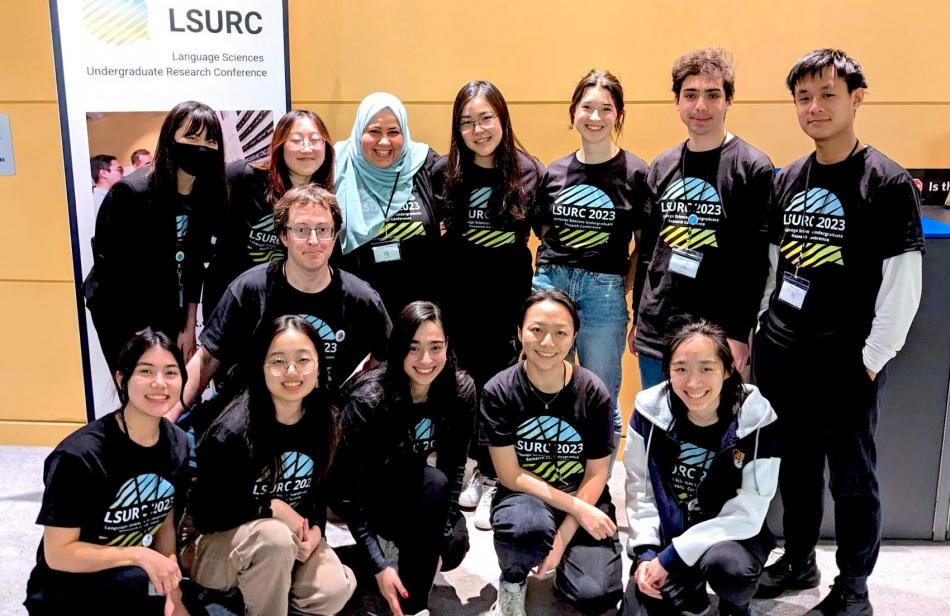Students have countless opportunities available to explore language and communication throughout their undergraduate careers, though gaining valuable research experience in those fields is an opportunity many undergraduate students feel isn’t readily available to them.
Fortunately, the Language Sciences Undergraduate Research Conference (LSURC) has been providing undergraduate students with the chance to explore language and communication research, and practice the skills required for presenting and speaking publicly in a formal academic setting, for the past seven years. The theme for this year’s interdisciplinary language-focused conference was ‘Mediums of Communication.’
Sherouk Shehata, a fourth-year UBC student completing a double-major in Integrated Sciences and Speech Sciences, who was one of the conference co-chairs, shared that she has been involved with the LSURC administrative team since 2020 and continues to be impressed by the research that undergraduate students conduct, and the opportunity that LSURC gives students to explore any avenue of language.
“Language is such an important and vital part of our society, but you rarely see language-based research being promoted as largely as fields of study like Psychology or Neuroscience, even though language is widely integrated into those fields,” said Shehata. “I think what makes this conference so unique is how specialized it is, and it gives students an opportunity to present what they love learning about. All of the students here are so passionate about language, and opportunities like LSURC really allow you to see where language research can take you.”
Shehata further explained that many undergraduate students have goals to attend graduate school and pursue research, but don’t actually get the opportunity to conduct research, or be involved in a research project in some capacity, prior to applying. She said that the time during your undergraduate degree is when students should explore as much as possible.
“You really need to try your hand at conducting research and presenting to see if that’s actually going to be a good fit for you. What if you didn’t get to do any research during your undergrad, then you get into grad school for research and end up not liking it,” said Shehata. “Undergrad is the time to experiment with things like courses, conferences, and research, so if you get the opportunity to work in a lab or do research, you should do it, and you should showcase the work that you did at LSURC. It’s something to be proud of!”
Jaimie Muller, a third-year UBC student majoring in Psychology and minoring in French, who was selected as a winner for her oral presentation on, ‘Measuring brain response when exposed to infant-directed speech: A meta-analysis’, explained that the feedback she received at LSURC actually prompted an idea for a potential future project for the Baby Learning Lab at UBC, where she is currently working.
“I received some great feedback from the adjudicators and others, and got a lot of good questions that made me reflect upon my research, and especially my inclusion criteria,” said Muller. “After talking with Dr. Janet Werker, the Principal Investigator from the UBC Infant Studies Centre, who suggested conducting the research with infant participants starting from birth rather than three months, it got us thinking about another prospective project to do in the future. I think that the LSURC experience really evolved the project and made it stronger.”
This year, Muller had originally planned to only apply for the Psychology Undergraduate Research Conference (PURC), but after presenting at LSURC and having such a positive experience, she decided to also apply for the Multidisciplinary Undergraduate Research Conference (MURC).
“I really feel like my experience at LSURC gave me so much more confidence applying to other conferences,” said Muller.
Madeline MacLean, a fourth-year Linguistics major and Speech Language Sciences minor from the University of Calgary, was selected as a winner for her research poster on, ‘The Role of Affective Prosody in the Perception of Emotional States’. She shared that there is so much value in the practice of writing an abstract for a research conference such as LSURC, and developing the skills necessary to pursue a future in research.
“It’s always a good idea to submit an abstract regardless of the outcome, because you learn how to consolidate your own information in a way that makes sense to other people, and helps others see the value in your work,” said MacLean. “To be able to communicate that meaning within a single page or less is a valuable skill to have, especially if you’re trying to pursue research, because you’ll have to write many abstracts!”
LSURC uniquely allows students from all disciplines to share their language-focused research, and MacLean expressed how grateful she was that LSURC allows students from all backgrounds to connect with their peers and learn about avenues of research they may be unfamiliar with.
“There’s amazing work being done in the language community and when given the chance to attend conferences, it gives us the opportunity to listen and learn how others design their research projects. I learned about linguistic areas that I don’t normally gravitate to in my own research, so it definitely expanded my knowledge,” said MacLean. “LSURC is such an inclusive and safe environment to dip your toes into research and understand what that entails. The University of Calgary encourages pursuing research and conference opportunities in the community, and without their support I wouldn’t have considered exercising this opportunity.”
To learn more about LSURC, click here to visit their website.
Written by Kelsea Franzke
